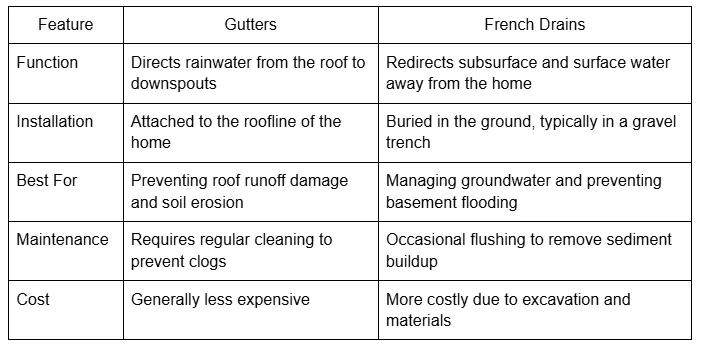Gutters vs. French Drains: Which Is Better for Your Home?
Managing water drainage around your home is essential for preventing costly foundation issues, basement flooding, and landscape erosion. Two of the most popular solutions are gutters and French drains, both designed to divert water safely away from your property. But which one is the better choice for your home? The answer depends on your specific water management needs, climate, and property layout. Below, we’ll explore the differences between gutters and French drains, their benefits, and how to decide which system is right for you.
What Are Gutters?
Gutters are installed along the edges of a roofline to collect rainwater and direct it away from a home’s foundation. They work by channeling water through a downspout system, preventing runoff from pooling near the house. Seamless gutter installation is one of the most effective options, as it reduces leaks and requires less maintenance compared to sectional gutters.
Benefits of Gutters
Protects the Foundation: By diverting water away from the home, gutters help prevent soil erosion and foundation damage.
Prevents Water Stains & Rot: Keeps rain from dripping down walls, which can cause mold growth and exterior staining.
Directs Water Away from Landscaping: Keeps flower beds and lawn areas from becoming oversaturated.
Customizable Options: Homeowners can choose from various materials, colors, and gutter guard installation options to reduce debris buildup.
Gutter Maintenance Considerations
While gutters are an excellent drainage solution, they require regular maintenance to remain effective. Leaves, twigs, and debris can accumulate, leading to clogs and overflows. Professional gutter cleaning services can help keep the system running smoothly, ensuring proper drainage year-round.
What Are French Drains?
French drains are underground drainage systems designed to redirect water away from your home’s foundation or yard. A French drain consists of a perforated pipe buried in a trench filled with gravel, which allows water to flow into the pipe and be carried away from problem areas. These systems are commonly used in areas with poor soil drainage or to prevent basement flooding.
Benefits of French Drains
Manages Groundwater Effectively: Ideal for properties with poor natural drainage or frequent pooling water.
Prevents Basement Flooding: Helps keep basements dry by channeling water away from the foundation.
Minimizes Soil Erosion: Reduces surface water runoff that can erode landscaping and walkways.
Long-Lasting Solution: Requires minimal maintenance once installed properly.
French Drain Maintenance Considerations
Though French drains are low maintenance, they can become clogged over time with sediment and roots. Occasional flushing or professional inspection may be needed to ensure they continue functioning properly.
Key Differences Between Gutters and French Drains
Both gutters and French drains serve essential water management roles, but they work in different ways. Here are the key differences:
Which One Does Your Home Need?
Deciding between gutters and French drains depends on your home’s specific needs. Here are some key factors to consider:
If You Experience Roof Runoff Issues: Gutters are essential for homes with sloped roofs where rainwater can accumulate and cause foundation damage.
If You Have a Flood-Prone Basement: A French drain is the better option if water pools around your foundation or seeps into your basement.
If You Have Poor Yard Drainage: French drains can help eliminate standing water in flat or clay-heavy soil areas.
If You Want Comprehensive Protection: Many homeowners benefit from installing both systems to ensure water is effectively managed above and below ground.
For expert advice on seamless gutter installation, gutter maintenance solutions, and other water drainage services, contact North Texas Gutters. Properly installed gutters can make a significant difference in protecting your home from water damage, ensuring long-term structural integrity and curb appeal.


